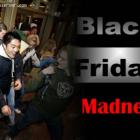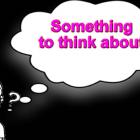ADVERTISEMENT
Voodoo - Haiti Observer Blog
Voodoo, Haiti Observer Blog. Read the following articles about Voodoo
Haoussa or Hausa Mystery in Haitian Culture, Is It True Or Not?
Houssa phenomenon is popular among Haiti businesses. This phenomenon is believed to have occurred when businesses suddenly and mysteriously lose money. There are many instances and stories told about certain Houssa people coming in to a store and buying something. They will pay in cash and get change from the seller. However, once they are gone, the seller would notice that they lost money and that their earnings do not add up. Many businesses experiencing losses blame it on the Houssa phenomenon.
However, is it really the main cause of losses? There are others questioning the truth behind the Houssa phenomenon, citing other possible reasons why businesses might have lost their sales. Mismanagement of the business is one reason. There are businessmen who fail to record all the transactions that happened in the day. Instead of recording it on paper, they try to keep the transactions in their memories, which they can forget at the end of the day.
Day of the Dead Celebration in Haiti
The day of the dead might strike the ignorant as a macabre event, especially in Haiti where the November 1st and 2nd celebration is intricately linked with Vodou. But the practice, shared by other countries such as Mexico and Guatemala, with roots as far-reaching into history the Aztec civilization, though called by other names in different locales, is not so much a dark, pagan ritual as a joyous celebration of the life of lost ancestors.
Hundreds of practitioners of the Vodou and Christian persuasion flock cemeteries and light homemade candles, strew flowers, and offer food and alcohol to the spirits Ghede and Baron Samdi. And since Vodou's legalization in 2003, the ceremonies have become more accessible and certainly more attractive to tourists wanting to witness the cultural spectacle.
Haiti Constitution of 1807
Title I. Abolishes slavery, grants residents full citizenship rights, protects property, and administers the death penalty for murder.
Title II. Sets up organization of government, appointing Henry Christophe President and Commander-in-Chief of the military. Empowers him to appoint his successor, sign treaties, and declare war.
Title III. Establishes Council of State and its functions under the President. Creates an Office of the Budget, presided over by a Budget Finance Director.
Title IV. Budget Finance Director shall also handle administration of Navy and Interior.
Title V. Creates a Secretary of State responsible for all intra- and inter-departmental correspondence, preparation of official government documents, and co-signatory duties.
Pierre Jenty orchestrates a Sham Voodoo Curse Bilks $20,000 out of Victim
A New York woman, believing she'd been hexed, sought services of a Voodoo practitioner, Pierre Jenty, in Miami Florida. Sixty-six year-old Jenty, a con artist, scammed upwards of $20,000 dollars out of her. It came to a violent end when she came up short of money on her last trip to him. She was drugged and raped.
The unidentified victim was a Haitian Voodoo believer. Voodoo, an integral part of Haitian culture, was brought to Haiti by Congolese slaves. When European colonists settled in Haiti, Catholicism became the dominant religion, forcing Voodoo underground. But Voodoo priests adopted Catholic practices, and the religions have co-existed peacefully since.
Anna Pierre, candidate for mayor of North Miami, threatened with Voodoo dolls
Mayoral candidate from North Miami, Anna Pierre, is one among eight people fighting for the post. Anna Pierre is a popular figure. She is a well-known nurse and a singer. Mete Suk Sou Bonbon - her hit song of the 1990's scaled up her popularity. She asked people from 3 countries to pray for her because there is someone who is using anonymous calls from blocked numbers along with sinister sorcery to prevent her from becoming mayor. Anna Pierre said that she found needle poked small dolls and ample amount of pennies in front of her office and being a person from Haiti, she knows the meaning of those things. She indicated towards voodoo practices being used by someone to throw her out of the race. Anna said that people from U.S., Canada and Haiti are praying for her and that she is not afraid because Jesus is with her.
Francois Duvalier, Minister of Public Health under Dumarsais Estime
Francois Duvalier who was appointed under the government of Estime, joined the government of President Dumarsais Estime, becoming director general of the national public health service. In 1948 he is appointed as minister of public health and labor.
After the military coup that overthrown the Estime regime on 10 May. 1950, Duvalier returns to his medical career. However, quietly and behind the scenes he begins organizing against the military regime that was in place then. By 1954 he is the central opposition figure and goes underground, hiding inside of the country.
The election of Dumarsais Estime represented a break with the traditional Haitian politic at the time. For one, he was anti-elitist and therefore generally anti Mulatto. The constitution was changed and came into effect in November 1946. He increased the representation of middle-class and lower-class blacks in the public sector and suggested that voodoo be considered as a religion equivalent to Roman Catholicism
Homosexuality And Voodoo
Homosexuality is still a sensitive issue in Haiti. Gay people are often discriminated and condemned and many of them are unable to express and show who they really are. However, not everything shuns homosexuality as there is one religion that accepts people of the third sex and that is Voodoo.
Voodoo religion has been linked to zombies, black magic, cannibalism and orgiastic rituals but what many people do not know is that this religion also worships one God. Voodoo practitioners have faith in one God and believe that they are guided by spirits called "loas" and "Iwas." And the doctrines of Voodoo are gay-friendly.
Mario Dupuy at Lakou Soukri during Guede Festival
The Haitian Minister of Culture, Jean Mario Dupuy celebrated the Lakou Soukri kings on the occasion of Guedes, the traditional festival in Haiti. This is just two months after returning to Gonaives from his visit to Lakous.
Mario Dupuy Marks His Presence
Shella Tanisma, the Empress and Marie Carme Delve, the servant, welcomed the Minister as per the rituals. Mario Dupuy stated that his presence amongst the people was a testimony to his commitment to the Republic's President, Michel Martelly, the government and Laurent Lamothe, the Prime Minister and that it demonstrates how important voodoo religion was in Haiti.
Lakou Souvenance, Soukri and Badjo during Guede Festival
The three most popular Voodoo sites in Haiti are Lakou Souvenance, Soukri and Badjo. These 3 houses are among the oldest in Haiti with large membership of voodoo practitioners performing authentic African traditions. Souvenance is known for Rada, Soukri tractices Petro and Badjo practices Nago
These Voodoo sites attract foreigners and locals in large numbers. In the past, this site would attract visitors from all over the world when they are having their annual festival. The Haitian government sees a possibility for the three Voodoo sites to attract tourists thereby help the country to generate additional revenue.
Voodoo Flag, a unique Haitian art
Voodoo flags are a significant form of art that define the Haitian art industry. Haitian flags depict a combination of several African beliefs and cultures. Voodoo flags have the history of the enslavement of Africans in Haiti. The art also brings on board the influence of Catholicism and Jamaican and Cuban cultures.
The Caribbean country had colonizers French and Spain take over in 1600s. The two colonies improved economic activities in the region. Demand for slave workers increased and more slaves were brought in from Africa.
The slave numbers increased until they outnumbered the colonizers. The slaves staged the only organized and successful slave revolt which led to independence.
Our objective is to share with you news and information about Haiti and the people of Haiti. Traditions, habits and the way we were or grew are alive in this site. We highly recommend that you Subscribe to our Newsletter and also share with us some of the things that are memorable and made us unique people.

 Haitian Creole Translation
Haitian Creole Translation  Battle of Vertieres
Battle of Vertieres  Black Friday Shopping Season
Black Friday Shopping Season  Something to think about
Something to think about  Informative Marketing and Advertising in the Haitian Community
Informative Marketing and Advertising in the Haitian Community